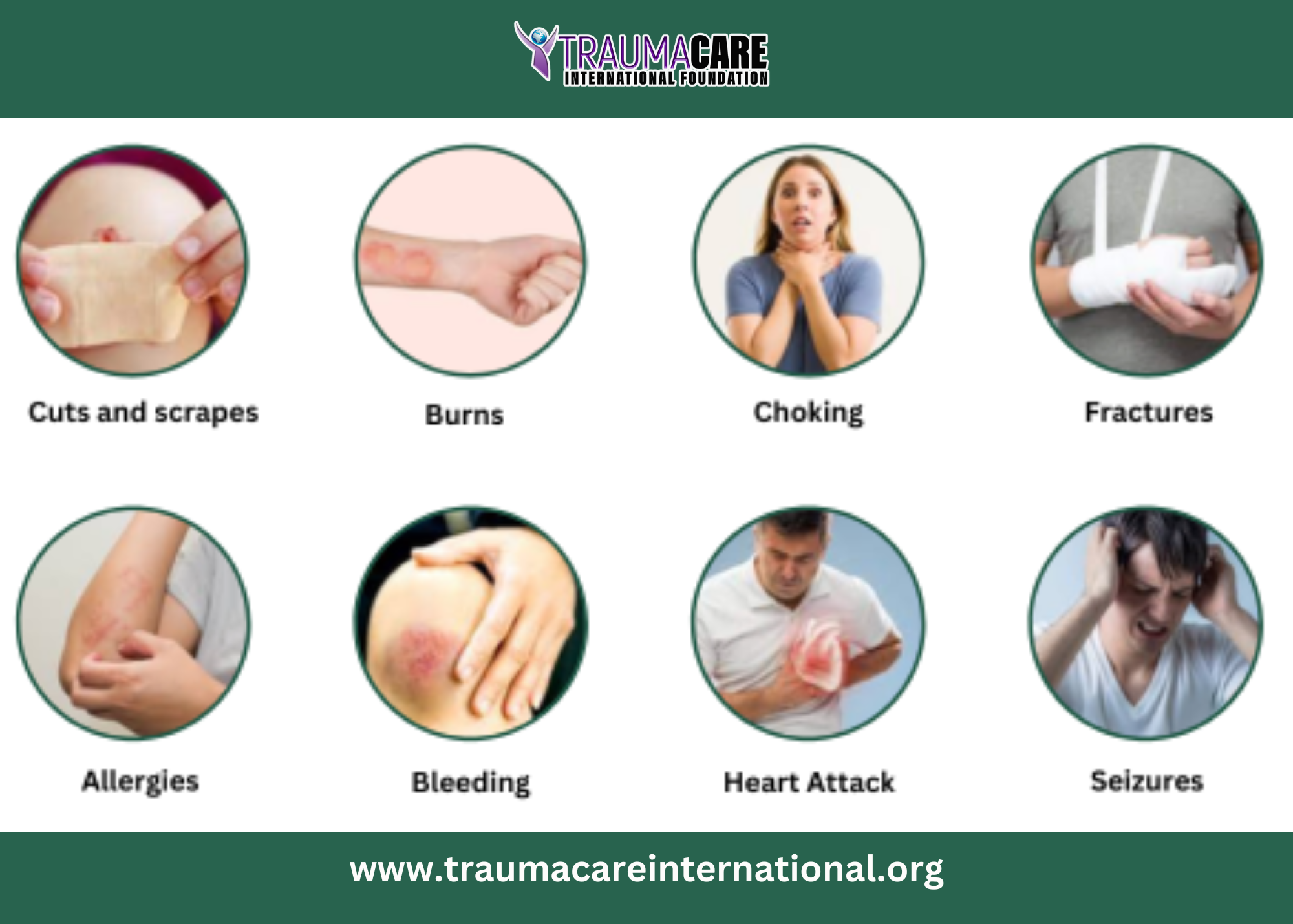Certainly! Here are some first aid tips for common injuries:
1. Cuts and Scrapes:
- Wash your hands thoroughly before providing aid.
- Clean the wound gently with mild soap and water.
- Apply an antibiotic ointment to prevent infection.
- Cover the wound with a sterile bandage or dressing.
2. Burns:
- Remove the person from the source of the burn.
- Cool the burn with cold running water for at least 10 minutes.
- Do not apply ice or very cold water directly to the burn.
- Cover the burn with a sterile non-stick dressing or a clean cloth.
3. Sprains and Strains:
- Rest the injured limb and avoid putting weight on it.
- Apply an ice pack wrapped in a cloth for 15-20 minutes to reduce swelling.
- Compress the area with an elastic bandage to control swelling.
- Elevate the injured limb above the heart level if possible.
4. Fractures and Broken Bones:
- Call for emergency medical assistance.
- Immobilize the injured area by using a splint or improvised materials.
- Apply ice packs wrapped in a cloth to help reduce pain and swelling.
- Keep the injured person still and comfortable until medical help arrives.
5. Nosebleeds:
- Have the person sit down and lean forward slightly.
- Pinch the soft part of the nose, just above the nostrils, for about 10 minutes.
- Apply a cold compress to the bridge of the nose to help constrict blood vessels.
- If bleeding continues after 20 minutes, seek medical attention.
6. Sprained Ankle:
- Rest the affected ankle and avoid putting weight on it.
- Apply ice packs wrapped in a cloth for 15-20 minutes every 2-3 hours.
- Compress the ankle with an elastic bandage to reduce swelling.
- Elevate the injured ankle above the heart level if possible.
7. Sprained Wrist:
- Immobilize the wrist by using a splint or makeshift support.
- Apply ice packs wrapped in a cloth for 15-20 minutes every 2-3 hours.
- Elevate the injured wrist above the heart level to help reduce swelling.
- Avoid using the injured wrist and seek medical attention if there is severe pain or deformity.
8. Eye Injuries:
- For a foreign object in the eye, do not rub the eye, as it can cause further damage.
- Flush the eye gently with clean water to try and remove the object.
- If the object doesn't come out, cover the eye with a sterile dressing and seek medical help.
- For chemical exposures, flush the eye with clean water for at least 15 minutes and seek immediate medical attention.
9. Insect Bites and Stings:
- Remove the stinger if present by scraping it off with a blunt object.
- Wash the affected area with soap and water.
- Apply a cold compress or ice pack wrapped in a cloth to reduce pain and swelling.
- If there is an allergic reaction, such as difficulty breathing or swelling of the face, seek emergency medical help.
10. Heat Exhaustion:
- Move the person to a cooler environment and remove excess clothing.
- Provide cool water or a sports drink to rehydrate.
- Apply cool, wet cloths to the person's skin or have them take a cool shower.
- If symptoms worsen or don't improve within 30 minutes, seek medical attention.
11. Choking:
- Encourage the person to cough forcefully.
- If the person cannot cough, speak, or breathe, perform the Heimlich maneuver.
- Stand behind the person, place your hands just above the navel, and perform upward thrusts.
- If the person becomes unconscious, start CPR and call emergency services.
12. Seizures:
- Stay calm and ensure the person's safety by removing any nearby objects that may cause harm.
- Cushion the person's head and turn them onto their side to prevent choking on saliva or vomit.
- Do not restrain the person or put anything in their mouth during the seizure.
- After the seizure, stay with the person until they regain consciousness and offer reassurance.
13. Allergic Reactions:
- If someone is experiencing a severe allergic reaction (anaphylaxis), call emergency services immediately.
- Help the person administer their prescribed epinephrine auto-injector (such as an EpiPen) if available.
- Assist the person in finding a comfortable position, like sitting up with their legs elevated.
- Loosen tight clothing and cover the person with a blanket to keep them warm.
14. Heatstroke:
- Move the person to a cooler area and remove excess clothing.
- Call emergency services immediately.
- Cool the person's body by applying cold water to their skin or using ice packs on their neck, armpits, and groin area.
- Fan the person or use a wet cloth to help evaporate heat.
Remember, these first aid tips are general guidelines and may not be suitable for every situation. It's crucial to assess the severity of the injury or condition and seek professional medical help when necessary. Additionally, consider taking a first aid and CPR course to gain more comprehensive knowledge and skills in providing first aid.
For more information.
Call: 0808 678 3416 or 08136427927
Email: [email protected], [email protected]
Download the TCERA app today to learn first aid skills.
https://lnkd.in/dAJR7bAB
https://bit.ly/tcera-IOS





What do you think?
0 Responses
To Comment, you must Sign In
Be the First to Post on this Topic